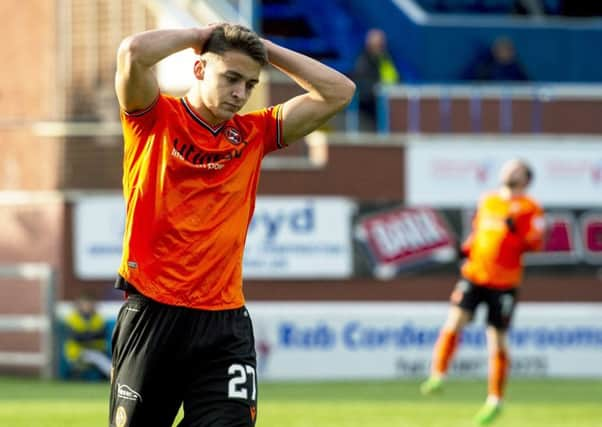Dundee United’s wage to turnover ratio is a mammoth 133 per cent


In the view of one supporter, United are “sleep walking into a very concerning scenario”. Others, meanwhile, are more comfortable with the situation, arguing that American owner Mark Ogren has been more than supportive and indeed is pushing the boat out to try to ensure promotion in what is the club’s fourth season of exile from the Premiership. There’s little doubt he’s been doing that.
Lawrence Shankland was convinced to stay in the Scottish Championship when top-flight clubs and those in England were circling. Persuasion of that sort does not come cheaply. The new accounts released in a brochure to shareholders show that the wage to turnover ratio is currently a mammoth 133 per cent. Many will surely have blanched upon reading this. Dundee United were once renowned for their fiscal prudence.
Advertisement
Hide AdAdvertisement
Hide AdThe accounts are to the end of June this year so the Shankland deal – he signed in July and is believed to be the costliest player at the club since Derek McInnes – is not even included in the latest financial statement.
To give some perspective, this time last year Rangers were spending 74 per cent of their turnover on their playing and coaching staff, a figure described as “eye watering” at the time. Anything below 60 per cent of turnover being spent on players’ wages is generally felt to be a satisfactory situation.
The Dundee United wage bill is currently around £4 million, while turnover – in these latest figures – is £3.12m (it was £3.19m the previous year).
The authorities need to look again at a play-off format so heavily loaded in favour of the 11th placed Premiership team and which almost demands this need to gamble.
Robbie Neilson is being backed to the hilt. Over 31 days in January, United signed 11 new players, with five arriving on deadline day. The manager has recently agreed a contract extension to 2022. Some wonder what he’s done – yet – to deserve this.
As is the way of these things, United slumped to a 4-0 defeat to Queen of the South a few days later. Since the 6-2 win over Dundee at Tannadice, they have failed to find the net in four of six outings, including games against Arbroath (in the Tunnock’s Caramel Wafer Challenge Cup) and Alloa Athletic, against whom they lost 2-0.
United aim to get back on track against Dunfermline today, when Minnesota-based Ogren will be watching from the stand along with his son, Scott, who is a director. They will hope to witness some return on this outlay of over £4m on wages.
It is certainly a substantial increase on last year, when wages totalled around £3m. The operating loss is £3.8m – the highest in the club’s history. Last year it was £1.6m.
Advertisement
Hide AdAdvertisement
Hide AdUnited can bank on getting money for Shankland, preferably after he has done what he’s been signed to do – fire the team to the title and, more importantly, to the Premiership.
As it stands, his maiden Scotland goal notwithstanding, he hasn’t scored since a hat-trick in the 6-0 win over Morton that sealed his international call-up.
There are no guarantees in this game, and, it seems, in this particular division, where it’s becoming an increasingly perilous business.